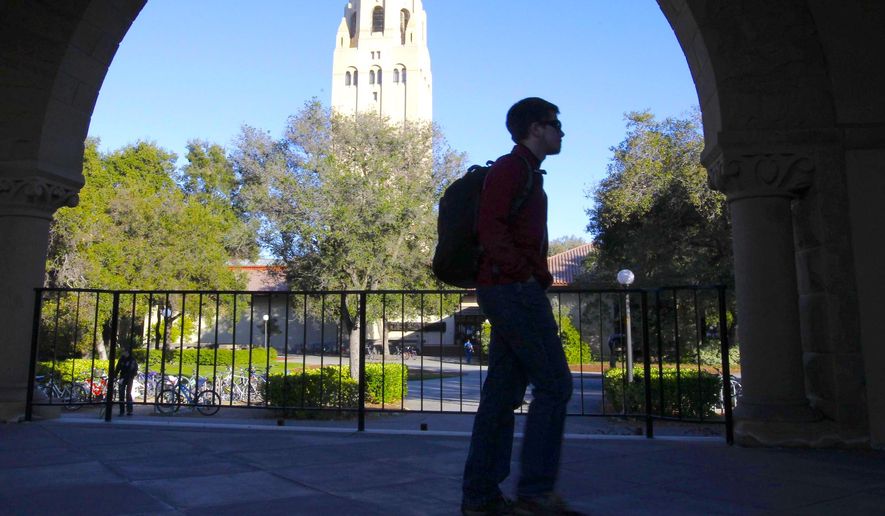A Justice Department program launched during the Trump administration targeting Chinese illicit technology theft is under fire from a group of Stanford University academics.
The group of 77 Stanford professors stated in an open letter to Attorney General Merrick Garland that the program known as the China Initiative is fueling academic bias and the unjust targeting of Asian American researchers.
While acknowledging the need to protect information for U.S. national security, “we believe, however, that the China Initiative has deviated significantly from its claimed mission: it is harming the United States’ research and technology competitiveness and it is fueling biases that, in turn, raise concerns about racial profiling,” the Sept. 8 letter states.
“We strongly urge you to terminate the China Initiative and develop an alternative response to the challenges posed by our relations with the People’s Republic of China, one that avoids racial profiling and discouraging beneficial and important collaborations and influx of talented personnel,” the letter adds.
The Justice Department program has resulted in scores of prosecutions of U.S. researchers as well as Chinese nationals and some intelligence officers, many of whom were linked to a Beijing program called “Thousand Talents.” The program targeted university professors and sought to channel their expertise and technological advances to assist China’s domestic development.
The China Initiative began about three years ago and has continued under the Biden administration, although the number of arrests and prosecutions under the program has decreased in recent months. A Chinese national in Boston last week was sentenced to two years in prison for illegally exporting more than $100,000 in U.S. goods to a Chinese military university.
Qin Shuren, 44, pleaded guilty to the illegal export charges in April related to illicit transfer of restricted drone technology for both aerial and underwater vehicles, and for missiles, prosecutors said. The restricted goods included side-scanning sonar systems, unmanned underwater vehicles, unmanned surface vehicles, robotic boats and hydrophones. Some were sent to a People’s Liberation Army unit.
The Justice Department said in a statement that Qin engaged in illegal exports to the Northwestern Polytechnical University, “a Chinese military university that is heavily involved in military research and works closely with the People’s Liberation Army (PLA) on the advancement of its military capabilities.”
In another China Initiative case, a federal judge in Tennessee last week threw out the case against a professor at the University of Tennessee in Knoxville, Anming Hu, who had been charged with hiding ties to China’s government in applying for research grants to work on a NASA project. Mr. Hu’s trial ended in a mistrial in June when jurors were unable to reach a verdict and prosecutors said they were planning to retry the case when the court stopped the suit.
Testimony in Mr. Hu’s trial included government agents who said Mr. Hu worked at the Beijing University of Technology at the same time he work at the Tennessee university.
The Stanford letter stated that the China Initiative unfairly targeted “researchers of Chinese origin.”
“Publicly available information indicates that investigations are often triggered not by any evidence of wrongdoing, but just because of a researcher’s connections with China,” the letter states. “Moreover racial profiling — even when undertaken in pursuit of justice — is both inconsistent with U.S. law and with the principles underlying our society.”
U.S. counterintelligence officials have said China in the past targeted Chinese-Americans in both technology acquisition and spy recruitment programs.
The Stanford letter asserted that university researchers have been targeted for investigation “only because of their personal or professional connections with China.”
The letter signers also said most China Initiative cases were not related to scientific espionage or intellectual property theft. I Instead, the charges mainly involved misconduct such as the failure to disclose foreign funding.
Notable among the signers of the letter is Thomas Fingar, a former deputy director of national intelligence for analysis, now with a Stanford think tank. Mr. Fingar was known for his pro-China views while in the U.S. intelligence community and as assistant secretary of state for intelligence from 2004 to 2005.
Most of the signers are part of Stanford’s science and technology programs, and many are Chinese-American.
• Bill Gertz can be reached at bgertz@washingtontimes.com.




Please read our comment policy before commenting.